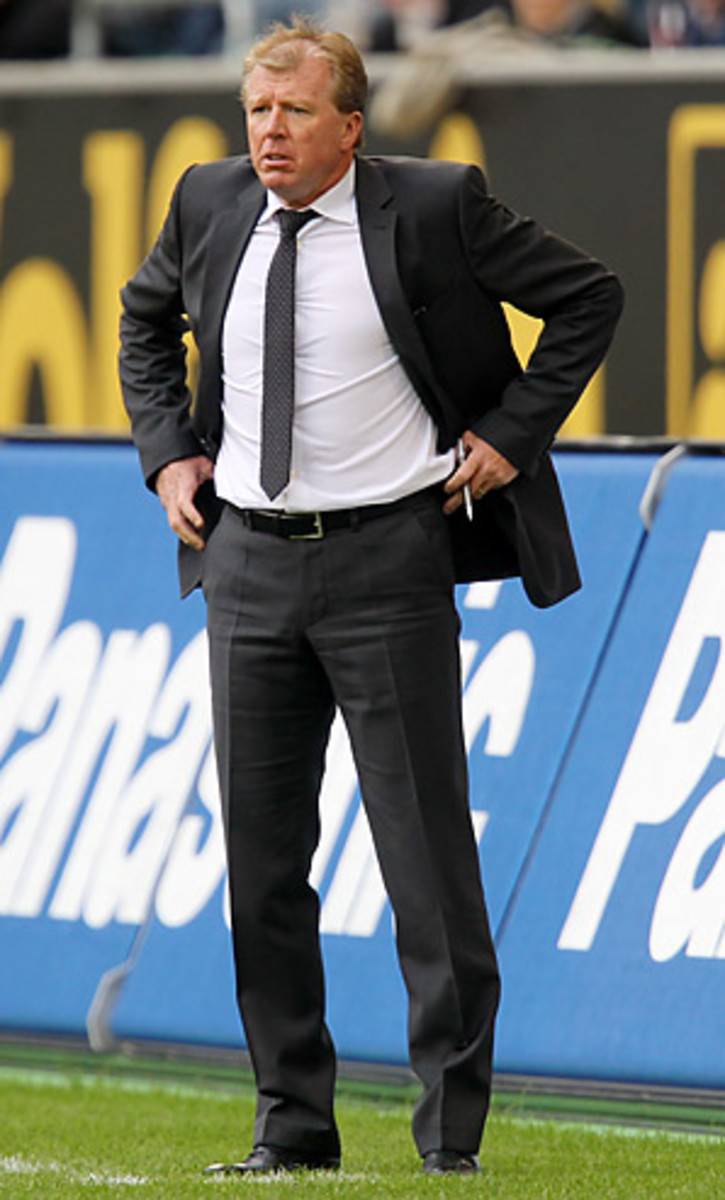Pressure mounting on McClaren
"Mister Brolly, take your Lolly (sic) and go home," one irate online reader of Wolfsburger Allgemeine Zeitung wrote in the wake of the 2009 Bundesliga champions' 2-0 defeat at Dortmund last Saturday.
"That's how quickly a Big Mac can turn into a chicken wing," joked another one.
These types of anti-McClaren comments in cyberspace are not widespread -- not yet, in any case. They do, however, suggest that the 49-year-old coach is in danger of being scapegoated for the club's worst start to a Bundesliga campaign. Wolfsburg played worse only in 1956, when the Lower Saxons racked up seven consecutive defeats in the lower-division Oberliga Nord.
Under McClaren, the team certainly won't stoop that low, if only for the fact that the manager would not survive such a prolonged lack of success. Wolfsburg has spent $50.6 million on new players (about $25 million in net terms) in the transfer window, more than any other team in Germany's top flight. It is based in a small, industrial town where emotions rarely run high but the club's generous owner, carmaker Volkswagen, will not tolerate bad results. Last January, Wolfsburg coach Armin Veh was fired in the aftermath of a 3-2 home defeat against FC Köln. The club was in 10th position in the league at the time. Today, it is 16th, separated by only one goal from last-place VfB Stuttgart.
Saturday's derby game against Hannover 96, the club that has signed U.S. international DaMarcus Beasley, is a must-not-lose affair, as far as McClaren is concerned. He has pleaded for patience and reminded everyone that two of the defeats came away to strong opponents, Munich and Dortmund.
"Of course there is pressure, there's always pressure to win football games," he told local reporters. "But I don't feel enormous pressure after three defeats."
McClaren insists that speaking to his players in English is "not an issue" and to be fair to him, journalists who watched his training sessions have noted that he makes himself understood perfectly well.
Simply soldiering on is not an option, however. To his credit, McClaren has realized that the new 4-2-3-1 system he introduced didn't work and is now reverting back to a 4-4-2 with a diamond in midfield.
"It's a system we know, we've been playing it for three years," striker Edin Dzeko said approvingly. The Bosnian has already scored three goals this season but has found himself isolated and bereft of service as a lone front man in the first few weeks. "It's not easy to win games when you don't play an attacking game," Dzeko said after the Dortmund defeat.
It's obvious that McClaren wanted to replicate the formula that won Twente the title in the Eredivisie, but he simply doesn't have the requisite wingers in his squad. Neither Algerian international Karim Ziani nor newcomer Mario Mandzukic (formerly of Dinamo Zagreb) are natural wide players. In addition, there are non-tactical problems: Germany center back Arne Friedrich, who excelled at the World Cup, is sidelined with a slipped disk, while highly rated Danish defender Simon Kjaer has not yet found his footing following his $13 million move from Palermo. Lack of stability at the back has affected the whole team.
"We need to find a way to keep a clean sheet again, first and foremost," Wolfsburg general manager Dieter Hoeness said.
The former Bayern Munich center forward has admitted that the club is in crisis and needs a victory against Hannover. Hoeness made a point of visiting the locker room after the final whistle in Dortmund. He boarded the team bus on the way home and spent much of Sunday and Monday talking to the players and the coaching staff.
"I'm not one for going to ground when things are not going well," he said.
McClaren will have to get used to having the influential Hoeness around, as the German club structure affords managers a lot less power than in England. General managers often get to work in times of trouble and are especially adept at playing the "bad cop" role because they're ultimately in charge of players' contracts. In that sense, it's business as usual. But the Englishman would be well advised to see Hoeness' involvement as a real warning sign. Back in January, when the 57-year-old Hoeness came into the job, he told reporters at his first news conference that he would debate matters with Veh "until we both share the same opinion." Ten days later, Veh was sacked.





